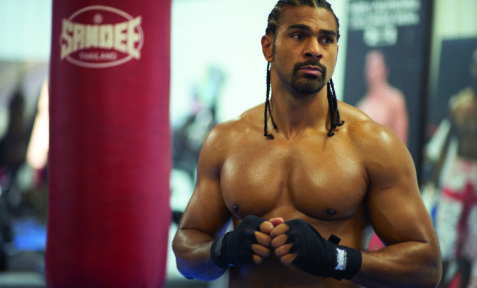Since claiming the WBO, IBF and WBA heavyweight titles in a stunning upset almost two months ago, Tyson Fury has been firmly camped in the media spotlight. In the aftermath of such an unexpected and historically significant victory, one would think that Tyson would be basking in the glory of this success. Instead however, his spotlight has turned from a warm glow to an uncomfortable glare as he has faced a sustained campaign of media negativity.
It began not long after the final bell in Dusseldorf, as a series of recent interviews given by Tyson were combed through for the juiciest nuggets of controversy. This Tyson furore continued into the BBC Sport’s Personality of the Year, as debate raged around Fury’s inclusion among the nominees and some 140,000 people signed a petition demanding his removal. The print-press prosecution continued this week with The Mirror running a story snappily titled “Tyson Fury Mentor Uncle was Drug Crime Baron Who Ran Amphetamine Empire from Inside Jail”.
The fact that Peter Fury has repaid the money he earned from past criminal activity, that he has not been in trouble since his release from prison and that he has spoken about how prison has changed his life seems an aside, as the article consistently paints the Furys in a negative light.
So what is the motive behind this sustained smear campaign? Most of the argument seems to be that, having become the heavyweight champion of the world, Fury is not only a role model but a harmful one and he is therefore a legitimate target for media scorn. There are two questions to answer here; is Tyson Fury a role model? And if so, is he really a harmful one?
Unfortunately, the answer to both questions is “potentially yes”. But it is the reasoning behind this answer that is so disappointing. Fury never claimed, asked nor wanted to be a role model. It is the huge increase in media attention that accompanied his stunning win which has catapulted him into this position. But more importantly, it is the determination of the media to focus solely on the negatives around Fury, at the expense of many positives, which has made him a potentially harmful influence. The media themselves have made Tyson Fury a role model, have made him a potentially harmful one and have then criticised Tyson Fury for that.
At this point it is important to clarify; I completely disagree with Tyson Fury’s beliefs about homosexuality. Religious freedom extends Tyson Fury the right to hold these beliefs and to express them without fear of persecution. His views on the role of women in society are antiquated and unhelpful, and are an unfortunate reflection on the role of women within traveller society. These comments combined, selectively lifted from a series of lengthy interviews, landed Fury in hot water and led 140,000 people to sign that famous petition.
Although he holds and expresses a number of opinions that I cannot endorse or defend, something that is often lost in the media controversy is Fury’s consistent attitude towards his own beliefs and opinions. Tyson regularly reminds us that these are simply the beliefs of his faith, or his own thoughts on the role of women. He is happy to accept that many people will disagree with him and clearly states that he is not seeking to enforce his beliefs on anyone. Of course, actions speak louder than words and in that regard, Fury has demonstrably practiced the acceptance he preaches.
In the week after his title win, a video emerged of Team Fury in the dressing room shortly before the fight. As they gathered for a pre-fight prayer, all members of the team were invited to offer a prayer in their own faith. Although Tyson has been vocal about the importance of his Christianity, Team Fury also includes members of the Islamic faith who freely contributed to this multi-religious prayer circle. Of course, this video of tolerance and acceptance received far less publicity, why let some positivity ruin a perfectly good scapegoat?
As a fighter, Fury is far from perfect. He has struggled with his weight at times and has been knocked on his ass in a couple of fights. Yet, he has learned his trade. He earned his title opportunity by forcing himself into the position of mandatory challenger and when he was presented with this opportunity, he dedicated himself to seizing it. Moreover, there is a culture in Britain and Ireland of lauding brave failure while treating clever success with suspicion. It is often reflected in our football teams who will always run harder than the rest and give it everything they have, “they’ll never be faulted for effort our boys” but will come up short when those pesky foreigners use their brains and skills instead of their heart and lungs.
Team Fury turned this cliché on its head by delivering a tactical and psychological masterclass. With the benefit of hindsight, the pre-fight antics and the failure to accept Wladimir’s attempts at gamesmanship take on a new light. Every effort was made to unsettle Klitschko both in and out of the ring. It had the effect of removing the control that Wladimir uses as a psychological safety-blanket. In the ring, Tyson’s constant and unpredictable movement rendered Klitschko gun-shy and he barely threw a right hand in anger.
It was fitting that Tyson Fury’s success was a team effort as his loyalty to the team around him has been one of his most admirable qualities. When Fury turned professional back in 2008, he signed with well-known promoter Mick Hennessy. At the time, Tyson was joined in the Hennessy stable by Carl Froch, Darren Barker and popular lightweight John Murray. Hennessy Sports had a television deal with ITV that opened up a huge potential audience and the young Tyson made his debut on ITV, featuring on the undercard of Carl Froch’s first world title win.
However, the collapse of the ITV deal left Hennessy Sports adrift in the television wilderness. Froch, Barker and John Murray all decided to abandon the sinking ship but Tyson Fury stayed. According to Mick Hennessy himself, Fury’s decision to stay is the main reason Hennessy Sports still exists today. Not only did Fury decide to stay, but he offered to forgo his purses in order to help his promoter get back on his feet,
“He (Fury) said he didn’t care how bad it got and said ‘I will be with you until the end’. He said, ‘If there’s no money on the table I will fight for nothing’.”
There is very little loyalty in professional sport these days, and certainly not loyalty that comes at the expense of a payday. But again, this incredible real-life “Jerry Maguire” story has been largely glossed over or ignored.
While his loyalty, his dedication, his sporting intelligence and his remarkable achievements in the ring are all praiseworthy, there are far more important attributes that mark Tyson Fury as a potentially positive figure. Depression and suicide are a huge issue for young people, particularly young men. Suicide remains a leading cause of death among young men in the UK. While in Ireland, it is the single leading cause of death in men between the ages of 15-34. There is a stigma that talking about your feelings is a sign of weakness and being open about mental health is discouraged by a “macho” culture. Young men are lacking role models who can help to change the deadly culture of silence that surrounds depression. More than perhaps any other sportsman, Tyson Fury could help fill that void, simply by being himself.
Tyson Fury is at the pinnacle of a sport often seen as the epitome of male toughness yet he is open and honest about his struggles with mental health. He has spoken in the past of suicidal thoughts, of depression and of feeling worthless at times. If the heavyweight champion of the world, the “baddest man on the planet”, is comfortable talking about his mental health, perhaps it will help other young men to do so. Yet this aspect of Fury’s character receives little attention. Positivity doesn’t sell as many papers, or generate as many clicks, as outrage.
Tyson Fury is far from perfect and he will be the first person to tell you that. But arguably, it is these faults that can make him a more powerful role model. In order for someone to be a role model, they need to be relatable. How can you seek to emulate or be inspired by a figure you can have no connection with? If you can relate to a role model with a no apparent problems, flaws or faults, then you probably don’t need a role model in the first place.
In the aftermath of David Bowie’s death, film director Guillermo Del Toro tweeted that “Bowie existed so all of us misfits learned that an oddity was a precious thing”. Fury is an oddity, a misfit. He’s the heavyweight champion of the world yet openly struggles with his mental health. He’s a man of strong religious beliefs, yet accepting of those who hold opposing views. He has overcome prejudices and a difficult, traumatic upbringing to literally fight his way to success.
He can be an inspiration to the imperfect youth, to those who struggle with their mental health, to those who face a lack of opportunities in life. These are the people most in need of an inspirational figure. Former heavyweight champion Mike Tyson, the man who inspired Fury’s first name, put it best when discussing Tyson Fury,
“You know who are going to look up to him? The people who never thought they had a chance in their life”.
– Michael McCarthy / @Mlmcc86







Leave a Reply